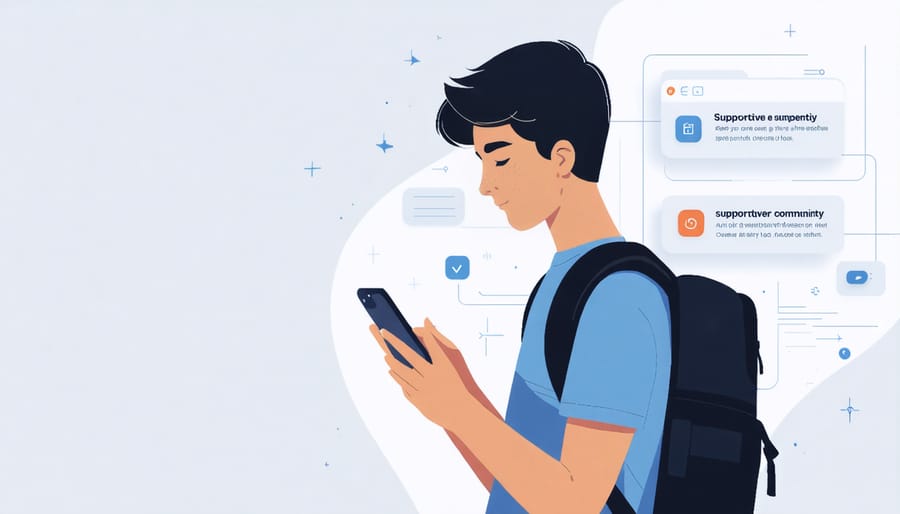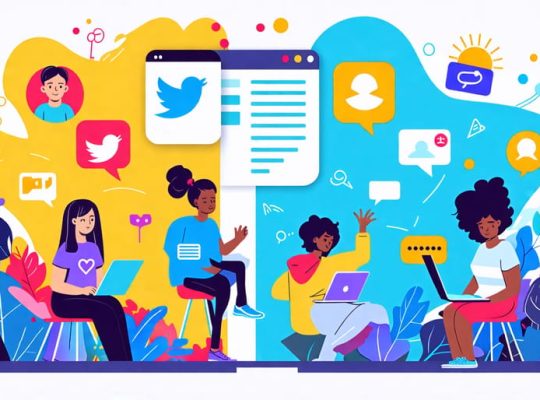Virtual communities have become lifelines for families navigating children’s mental health challenges, offering support that extends far beyond traditional resources. These digital spaces, built on proven principles of peer support, create safe havens where parents, educators, and healthcare professionals connect, share experiences, and access vital resources 24/7. From moderated Facebook groups specifically designed for parents of children with anxiety to professionally-supervised Discord servers for teens managing depression, these online communities provide crucial emotional support while maintaining careful boundaries and expert oversight. Whether you’re a parent seeking guidance, a teacher looking for classroom strategies, or a mental health professional expanding your support network, today’s virtual communities offer carefully curated spaces where understanding, expertise, and compassion intersect to support children’s mental well-being.

Parenting Support Groups That Make a Real Difference
Facebook Groups for Special Needs Parents
Facebook groups have become vital lifelines for parents navigating the challenges of raising children with special needs. While the impact of social media can be complex, these carefully moderated communities offer invaluable support and resources.
“Autism Parents Support Network” stands out with over 50,000 members sharing daily experiences, strategies, and encouragement. Parents appreciate the group’s strict verification process and active moderation team, ensuring a safe space for vulnerable discussions. Members often highlight how the 24/7 availability of support has helped them through challenging moments.
“ADHD Parenting Solutions” provides a blend of peer support and professional guidance, with verified healthcare professionals regularly contributing insights. The group’s resource library includes educational materials, medication experiences, and school advocacy tips shared by seasoned parents.
“Anxiety in Children Support Group” offers a judgment-free zone where parents can discuss their children’s anxiety challenges. Weekly live Q&A sessions with child psychologists and success story spotlights make this community particularly engaging.
These groups maintain strict privacy settings and posting guidelines to protect members’ confidentiality. Many parents report finding not just practical advice but also lasting friendships through these communities, transforming their journey from one of isolation to connection and hope.
Reddit’s Parenting Mental Health Forums
Reddit hosts several supportive communities where parents can connect, share experiences, and seek advice about children’s mental health challenges. Popular subreddits like r/ParentingMentalHealth and r/ParentSupport create safe spaces for open discussions about everything from anxiety and ADHD to depression and autism spectrum disorders.
These forums are particularly valuable because they combine peer support with moderated content and frequent contributions from mental health professionals. Parents can find real-time support at any hour, making it especially helpful during crisis moments or late-night worry sessions.
What sets Reddit’s parenting mental health communities apart is their focus on specific challenges. For instance, r/ADHDParenting specifically addresses raising children with attention deficit disorders, while r/AnxiousParents helps caregivers manage their own mental health while supporting their children.
Moderators in these communities maintain strict guidelines to ensure discussions remain constructive and supportive. They often provide resource lists, weekly check-in threads, and crisis information. Many parents report finding comfort in knowing they’re not alone in their struggles, and appreciate the anonymous nature of Reddit that allows for more candid discussions about sensitive topics.
These communities also frequently host AMAs (Ask Me Anything) sessions with child psychologists, family therapists, and other mental health professionals, bridging the gap between peer support and professional guidance.
Professional Networks Supporting Child Mental Health
Healthcare Provider Networks
Healthcare professionals supporting children’s mental health have access to several specialized virtual networks that facilitate knowledge sharing and collaboration. Doximity, a secure platform exclusively for verified medical professionals, enables therapists, psychiatrists, and pediatricians to consult on complex cases while maintaining patient privacy. Members can join focused groups dedicated to child and adolescent mental health, sharing evidence-based treatment approaches and resources.
The Child Mind Institute’s Professional Portal offers a collaborative space where mental health providers can access peer support, continuing education resources, and treatment guidelines. This community particularly benefits those working in underserved areas who may not have local access to specialized expertise.
Specialty platforms like PsychiatryNetwork provide forums where professionals can discuss challenging cases, share research findings, and connect with colleagues who have similar interests in youth mental health. These spaces often feature expert-led discussions and virtual grand rounds, making specialized knowledge more accessible to practitioners everywhere.
Many providers also participate in moderated LinkedIn groups focused on children’s mental health, where they can network with colleagues, share resources, and stay updated on the latest treatment approaches while maintaining professional boundaries and ethical standards.

Educational Support Communities
Educational support communities have become vital spaces where teachers and school counselors can collaborate and share resources to better support students’ mental health needs. The Educator’s Mental Health Network, for example, connects over 50,000 education professionals worldwide who share strategies for creating trauma-informed classrooms and implementing social-emotional learning programs.
School Counselor Connect serves as a platform where counselors exchange best practices, discuss challenging cases (while maintaining student privacy), and access professional development resources. Members report feeling less isolated and better equipped to handle complex student situations through peer support and mentorship opportunities.
Teaching Through Trauma is another notable community where educators share experiences and evidence-based approaches for supporting students dealing with mental health challenges. Their weekly virtual meetups feature expert speakers and collaborative problem-solving sessions.
These communities often include dedicated spaces for specific grade levels or specialties, allowing for targeted discussions and resource sharing. Many also offer private messaging features for one-on-one professional consultation and maintain strict verification processes to ensure a secure environment for sensitive discussions about student well-being.
Teen-Focused Mental Health Communities
Moderated Teen Support Forums
Moderated teen support forums provide safe, supervised spaces where adolescents can connect with peers facing similar challenges. These virtual communities combine peer support for youth with professional oversight, creating environments where teens can openly discuss their experiences while maintaining safety and privacy.
Popular platforms like TeenLine and ReachOut Forums employ trained moderators who guide discussions, ensure appropriate content, and provide crisis intervention when needed. These forums typically feature separate sections for different topics, from academic stress to family relationships, allowing teens to find specific support for their unique situations.
What makes these communities particularly effective is their blend of peer connection and professional guidance. Moderators, often including counselors and youth workers, help maintain boundaries while allowing authentic teen voices to shine through. Many forums also offer resources like wellness tools, coping strategies, and direct links to crisis services.
Parents and educators appreciate these spaces because they provide structured support while helping teens develop digital literacy and healthy online communication skills.
Mental Health Apps with Community Features
Mental health apps have evolved to become powerful platforms where healing and community support intersect. Apps like Calm Collective and Sanvello offer safe spaces where users can access both professional mental health tools and peer support features. These apps create micro-communities around specific challenges, such as anxiety or depression, allowing members to share experiences and coping strategies.
For example, Headspace now includes group meditation sessions and community discussion boards where members can connect with others on similar mindfulness journeys. The Moodfit app combines mood tracking with community forums, enabling users to share their progress and receive encouragement from others who understand their struggles.
What makes these platforms particularly effective is their blend of evidence-based therapeutic tools with genuine human connection. Users can access guided exercises and professional resources while participating in moderated group discussions. These apps typically include features like anonymous sharing options, crisis support resources, and trained moderators to ensure a safe, supportive environment.
Many of these platforms also offer specialized groups for parents and caregivers, creating valuable spaces where families can find understanding and practical advice from others facing similar challenges.

Virtual communities have become essential lifelines for parents, educators, and healthcare professionals seeking support and guidance in children’s mental health. These online spaces offer invaluable opportunities to connect, share experiences, and access expert knowledge from the comfort of home. Whether you’re a parent looking for advice, a teacher seeking classroom strategies, or a professional expanding your network, there’s a virtual community that can meet your needs.
When choosing a virtual community, consider factors like privacy settings, moderation policies, and professional oversight. Look for groups that maintain clear guidelines, foster respectful dialogue, and prioritize evidence-based information. Remember that the best communities often combine peer support with professional guidance, creating a balanced environment for learning and sharing.
While online communities can provide tremendous support, they should complement, not replace, professional mental health care. Use these spaces to build connections, gather information, and find emotional support, but always consult qualified healthcare providers for specific medical advice or treatment plans. By engaging thoughtfully in virtual communities, you can create meaningful connections and access valuable resources that support children’s mental health journey.







